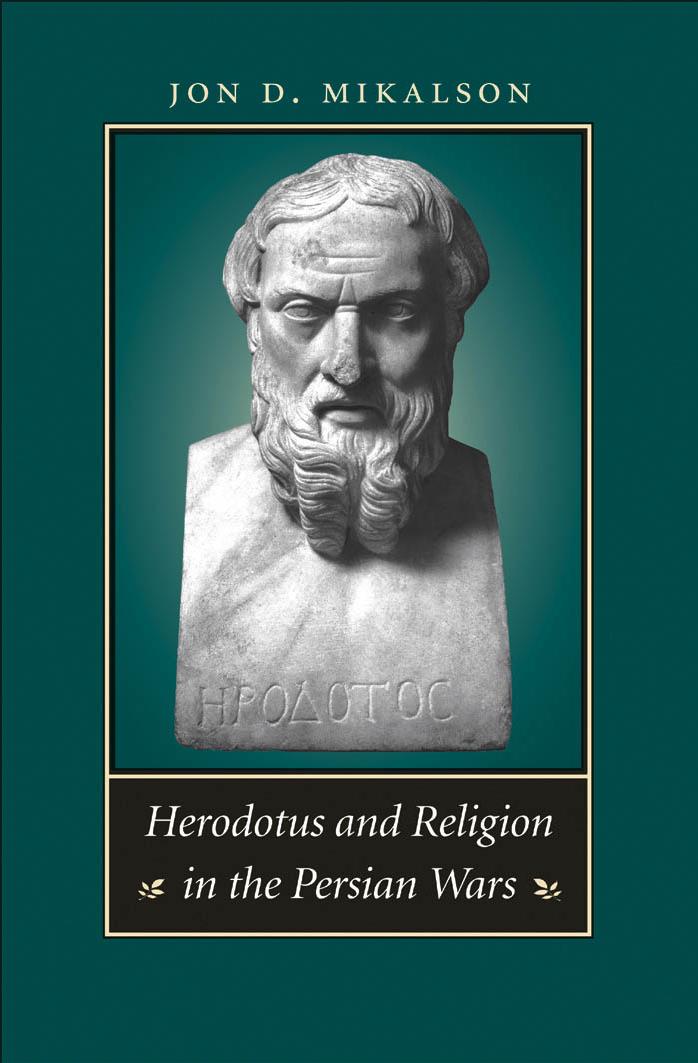Herodotus and Religion in the Persian Wars by Jon D. Mikalson

Author:Jon D. Mikalson [Mikalson, Jon D.]
Language: eng
Format: epub, pdf
Tags: Ancient, Antiquities & Archaeology, Greece, History, Non-Fiction, Religion
ISBN: 9780807862018
Google: nM9FAwAAQBAJ
Amazon: 0807827983
Publisher: Univ of North Carolina Press
Published: 2003-09-14T23:00:00+00:00
The dreams proved true, and despite Astyages’ concerted efforts, Mandane’s son Cyrus became king and the founder of the Persian dynasty.
Cyrus himself later had a similarly complex and accurate dream about Darius (1.209–210), as did the later Persian king Cambyses about the revolt of “Smerdis” (3.30.2–3). Such elaborate dreamings, simply coming true or, as in Cambyses’ case, coming true in an unexpected way, are characteristic of dreams in Greek poetry, particularly tragedy. The closest parallel, in subject, time, and setting, is the elaborate dream Aeschylus gives to Xerxes’ mother in the Persae (176–199).75 Most important for the Persian Wars were, of course, the dreams that urged, virtually forced Xerxes to undertake the expedition (7.12–18). These dreams and the debate about them between Xerxes and Artabanus are very Greek, no less so than the famous “Greek” debate about the ideal constitution among the Persian leaders Darius, Otanes, and Megabyzus (3.80–82).76
In Herodotus Greek-style oaths are a common feature of international dealings. Cyrus has a sworn treaty with the Milesians (1.141.4, 143.1, and 169.2), Otanes with some Samians (3.144), and Darius with the Milesian Histiaeus (5.106.6), the last being by Persian, not Greek gods. The rebellious magoi put a Persian fellow conspirator under oath (3.74.2). The Greek physician Democedes had Xerxes’ mother Atossa swear an oath that, if he healed her breast cancer, she would do for him whatever he wanted (3.133.2). In a similar situation, recalling the oaths of the Spartans Agetus and Ariston (6.62–63.1), Xerxes swore an oath to his mistress that he would give her whatever she wanted (9.109.2). Such open-ended promises secured by oaths invariably, of course, brought misfortune to the unwary person who made them. The Persians in all these cases, as Greeks were expected to do, remained true to their oaths even in the face of disaster. Herodotus even has the Persian king Cyrus decry the casual perjury of Greek merchants in the marketplace (1.153.1–2).
Finally, Herodotus has his Persians do a number of very traditionally Greek things in the religious realm. They make tithes (1.89.3), libations (7.54.2 and 223.1), offerings in return for being saved (1.118.2 and 8.99.1), and tomb offerings at a funeral (7.117), and they show respect for rivers (1.138.2), xenia (7.27–29 and 39.2), and heralds (7.133–137). In the case of the heralds Xerxes upheld Greek traditions better than did the Spartans and Athenians.
In terms of religious beliefs and practices, Herodotus makes his Persians very Greek. He struggles, for example, to make Cyrus’ putting of Croesus and fourteen Lydian children on a pyre intelligible in terms traditional to Greek religion: “Cyrus intended to make them firstfruit offerings to one of the gods, or to pay a vow, or else he put Croesus on the pyre because he had heard that Croesus was god-respecting and wanted to know if one of the gods would rescue him from being burned alive” (1.86.2). And it was Herodotus’ opinion that Cambyses’ impieties showed that he was mad (3.37–38). In both cases we have Herodotus’ own suggestions for understanding the
Download
Herodotus and Religion in the Persian Wars by Jon D. Mikalson.pdf
This site does not store any files on its server. We only index and link to content provided by other sites. Please contact the content providers to delete copyright contents if any and email us, we'll remove relevant links or contents immediately.
| Anthropology | Archaeology |
| Philosophy | Politics & Government |
| Social Sciences | Sociology |
| Women's Studies |
Mysteries by Colin Wilson(2887)
People of the Earth: An Introduction to World Prehistory by Dr. Brian Fagan & Nadia Durrani(2347)
Ancient Worlds by Michael Scott(2104)
Foreign Devils on the Silk Road: The Search for the Lost Treasures of Central Asia by Peter Hopkirk(2056)
The Memory Code by Lynne Kelly(1948)
Lost Technologies of Ancient Egypt by Christopher Dunn(1799)
The Splendid and the Vile by Erik Larson(1784)
Come, Tell Me How You Live by Mallowan Agatha Christie(1769)
The Earth Chronicles Handbook by Zecharia Sitchin(1748)
The Plantagenets by Dan Jones(1617)
Last Chance to See by Douglas Adams(1601)
The Return of the Gods by Erich von Daniken(1573)
Wars of the Anunnaki by Chris H. Hardy(1392)
Before the Dawn by Nicholas Wade(1317)
Keeper of Genesis by Graham Hancock(1280)
The Cygnus Mystery by Andrew Collins(1259)
The Message of the Sphinx by Graham Hancock(1224)
Fragile Lives by Stephen Westaby(1117)
Hieroglyphs: A Very Short Introduction by Penelope Wilson(1035)
